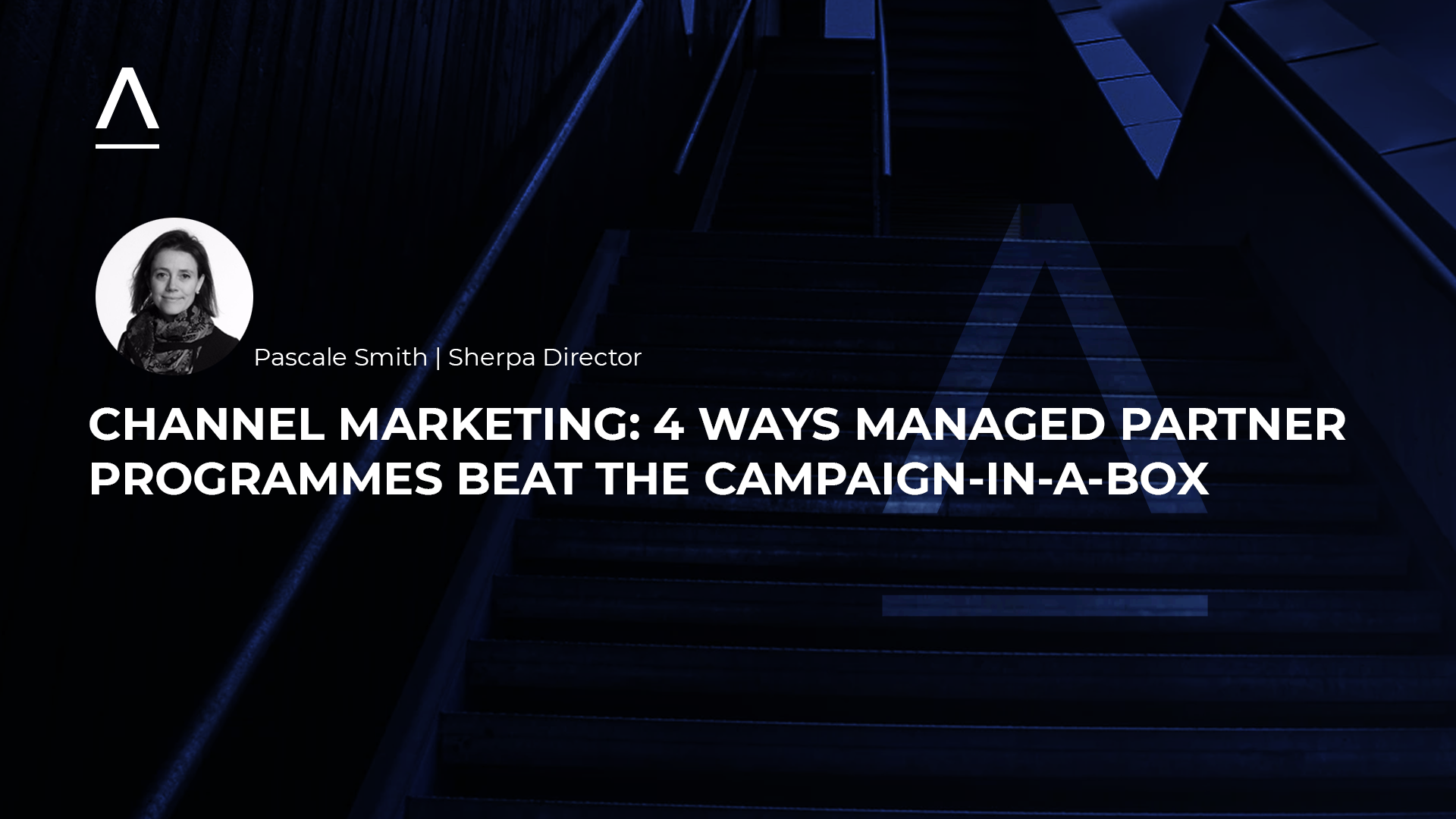On-demand webinar: The Partner Marketing Funnel: Introducing the 4 Why's
Partner marketing isn’t just about generating leads. It’s about moving opportunities through the funnel with clarity and purpose. Yet for many...
4 min read
Ruth Savory Dec 13, 2022 12:05:29 PM
.png)
We were joined by two Partnerships and ecosystem professionals for our latest webinar, ‘Plan your Partner landscape to help recession proof your Channel”. Alongside Sherpa’s CEO, Tom Perry and Director, Pascale Smith, were Kate Daly, Senior Channel Marketing Manager at Comcast Business with over 15 years of experience in the direct and indirect Channel industry and Kate Rimolo, Group Manager of Partner Marketing at Zendesk who manages the US and Canada Partner program, with experience in marketing, strategy, analytics and sales. We broached the topic of Partner evaluation - as during turbulent times - tech Vendors are finding out that only with a collaborative and successful Partner mix, can you successfully plan and achieve growth.
“Do I have the right mix of Partners - not only for the current environment but also for the future?” is a question floating around Vendor strategy teams at the moment. One which is even more pertinent as we are overshadowed by gloomy themes of recession and layoffs. It is all well and good knowing the need for a strong Partner ecosystem, so Tom Perry posed the question to Kate Rimolo, “How do you know if you have the right mix?”. Kate explained that this is “the biggest question we have asked ourselves this year” and this resonated with Zendesk for being set-up for success today and in the future. Zendesk took a qualitative and quantitative approach analysing their Partner landscape, and recognised that even though we find ourselves in a new environment the company targets and objectives had not changed. So work had to be done to adjust to this.
Zendesk partnered with Sherpa to take a deep-dive into their Partner ecosystem and find out what was going well and what wasn’t, primarily investigating…
Kate Daly explained that it is often the Partner community that initiates the need for a Partner assessment because each Partner brings a different set of benefits and capabilities to the relationship. For example, one might be a great producer of product development and R&D but not necessarily strong at delivering regular revenue. (More on exploring gaps in your Partner community later). Kate Rimolo echoed the idea that not all Partners are strong in all areas e.g. marketing, which is information that helped them build an improved ideal Partner profile and then being able to invest in all areas of the business as a result of such introspection.
Pascale Smith leads much of the strategy work behind Partner ecosystems for clients who are early on in their discovery phase of identifying requirements, as well as working on the delivery of our Partner assessment projects at Sherpa. She explains that the key question she asks in many conversations is, “How is value being delivered to us as a Vendor from Partners?”. It goes much broader than revenue - it can include engagement, capability to do more and Partner attitude. Translating this information into data - though can be complex to create and manifest - it’s vital to have a clear view of where improvements can be made, making an easier route to more funding and better strategic planning in the New Year.
Kate Daly explained that the Channel continues to be a priority for Comcast Business. There is greater focus on solution selling and the idea that ‘out of the box’ marketing tools doesn’t always work for Partners that require a more white glove, custom solution. The acquisition of Masergy also shows the companies’ commitment to Channel strategy in a way that only a few years ago, might have been counterproductive. Pascale emphasised that you simply cannot get the support and guidance required when you buy direct. So having a Channel strategy, like Zendesk and Comcast Business - we said it last year - really is more important than ever!
Zendesk
Comcast Business
One important theme that was explored in the webinar was the gap between delivery and capabilities that Partners have - such as Partner marketing capacity vs the amount of marketing support they have given. The key question is - what kind of Partners do we not have - e.g. producer Partners? In her conversations with Vendors, Pascale explains one strategy; instead of just identifying gaps in your ecosystem to fill with new Partners, one must leverage - through investment - their high performing partners. It is better to make investments and provide a strategically high quality Partner program to scale and get the most out of these more fruitful Partnerships.
Kate Rimolo explains that in 2023 the number one priority for Zendesk is Partner demand generation and enablement. Also it is understanding the value of support from Zendesk by improving Partner engagement through marketing. Pascale elaborates saying there are so many ways and combinations of doing Partner marketing - from through Channel marketing automation to lead generation tactics to campaign-in-a-box. So there is no one way to do things; nevertheless a stream of support and messaging constantly has to be delivered to Partners to enhance the relationship.
Flexibility - Identifying the specific strengths in your relationship with your Partner can really provide a strong value proposition. This can be done, as Kate Daly explores by taking a holistic approach to outreach, such as reaching into new geographies or having conversations with new members of your Partner team, and leveraging your own capabilities (e.g. technology) to aid and grow with another Partner. She summarises - “Pivot when you need to - but this isn't always going to happen during your planning phase.”
Enablement - Zendesk’s view of enablement is explained by Kate Rimolo as “collaborating with Partners from day one and understanding what their challenges are is vital - having the enablement conversation with our Partners goes hand in hand with our business planning process with specialist support from the start the key to success.”
.jpeg)
Partner marketing isn’t just about generating leads. It’s about moving opportunities through the funnel with clarity and purpose. Yet for many...
%20(19).png)
Partner marketing is entering a new era.

Partner marketing isn’t just evolving, it’s accelerating. With buying committees now stretching to 20+ decision-makers, AI reshaping how we work, and...

Partners bring scale, vertical expertise, customer management skills and renewal process to technology vendors - it goes without saying that the...
-2.png)
Sherpa's CEO Tom Perry joined Impartners Masterclass with Dave Taylor and Trevor Burnett discussing 'how to scale demand marketing with your...

The demands made of channel Partner marketing are significant: it needs to scale, demonstrate ROI, generate revenue (often within a quarter), reflect...